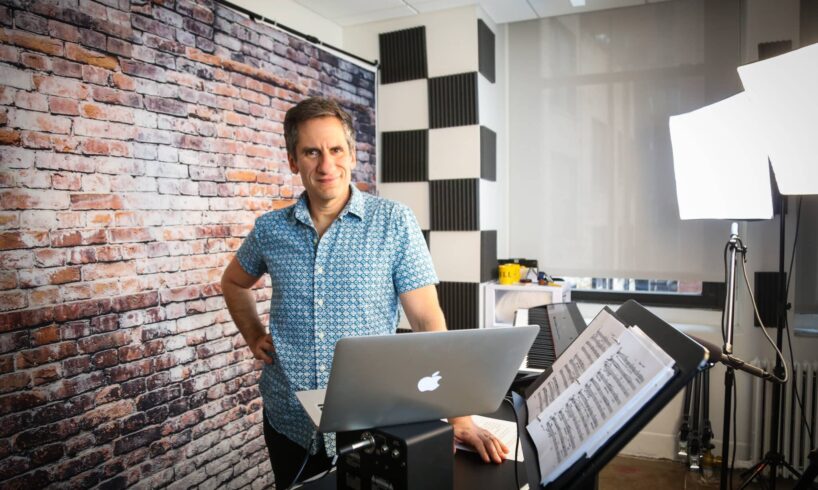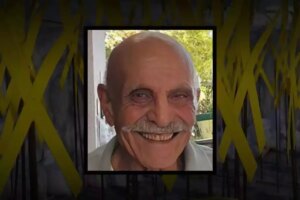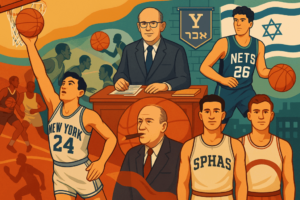
No matter what time of day or night, whether there is a show in production or not, there is a tradition that, in every theater, one light must remain lit.
It is called the “ghost light,” and it is there to keep evil spirits away (and, more practically, to keep people from falling into the orchestra pit). Some say it resembles the ner tamid, the everlasting light kept burning throughout the year in synagogues. In any case, it goes to show that one light can save lives.
On Broadway today, Seth Rudetsky aims to be that kind of light — not only as a relentless champion of musical theater, but as a public Jewish presence in a moment when many artists feel pressure to shrink from it.
Known to millions for his ”Big Fat Broadway” show on Sirius XM (and his even bigger personality), Rudetsky recently launched a new broadcast that features Jewish and non-Jewish actors and celebrities who take time out each week to light candles, say the prayers, and offer a blessing of healing to their family, friends, and the world. Among past participants have been comedian Judy Gold, cast members from “The Outsiders” and “The Baker’s Wife,” and a mi sheiberach sung by Lorna Patterson, who was the singing stewardess in the hilarious film “Airplane” and is now a cantor.
“People said there are so many sad things about Jews in the news,” Rudetsky told Unpacked when asked about the birth of Broadway Shabbat. “We wanted to spread some Jewish joy.”
That instinct — turning toward ritual and joy during a time of increased antisemitism — is not a shiny side project. It comes out of how Rudetsky understands Jewish life and Broadway life as intertwined: both built on tradition, community, and the belief that song can carry people through fear.
Why Seth Rudetsky spoke out
What’s striking is that this very public Jewish role is a relatively new chapter for him. For most of his life, Jewish advocacy wasn’t where he put his energy. He had dedicated himself to Broadway and to broad social justice causes, but, as he recently admitted on Jonah Platt’s podcast “Being Jewish,” “I haven’t really ever focused on anything Jewish.” He explained that he rarely felt targeted as Jewish, and that Israel-related issues felt fraught and distant.
Then October 7 happened.
At the time, Rudetsky was away at sea, running one of his Broadway Cruises — the floating, week-long theater incubators he hosts where passengers take master classes, rehearse, and ultimately perform alongside Broadway stars in a variety show. Because he was on the ship, he didn’t get the news in full. At first, he registered only that something awful had happened in Israel. He didn’t grasp the scale of it until he returned and received an email from Israeli-American Broadway supporter Michael Rubin.
Rubin’s message was simple and devastating: the Broadway community speaks out about so many causes; why was it silent now? “Have people forgotten that Jewish people have so much to do with Broadway?” he asked.
Rudetsky’s first reaction was avoidance. Then something shifted. He couldn’t un-hear the question. He started to look around at the community he had spent his whole life championing and suddenly felt how fragile Jewish belonging could be inside it.
His first steps were small — emotional posts on social media, trying to understand why sympathy felt scarce. But almost immediately, those steps turned into action. Debra Messing reached out about organizing a video to support Israelis held hostage in Gaza. Rudetsky helped shape the message and then did what he’s always done best: he called people, gathered them, and got it made.
He expected this kind of basic humanitarian plea to be uncontroversial. “It literally just said, ‘Bring them home,’” he emphasized. But even that, he found, was polarizing in ways he was not prepared for. One colleague refused to participate. Another replied with what he described as deeply hostile misinformation. He had dedicated his life to progressive causes; suddenly, his Jewish concern was being treated as suspect.
As the days went on, the sense of alienation grew sharper. Rudetsky describes the Broadway shift as almost immediate: a noticeable lack of public sympathy, and in some corners a quick adoption of propaganda. “I saw so much misinformation being posted online,” he explained. “Most devastatingly, it was from people I had worked side-by-side with to promote social justice.”
Speaking out came with a personal cost, too. “It’s been difficult,” he said. “But I try not to engage, because when people are that hateful, they aren’t looking for a back-and-forth with facts. They just want to attack.”
Creating Jewish spaces on Broadway
Trying to figure out what to do next, Rudetsky turned to someone who knew how artists organize in crisis: Schele Williams, a friend and a co-founder of Black Theatre United. When he asked how to get Broadway institutions to show up for Jews the way they showed up for other groups, Williams told him bluntly that they couldn’t wait for someone else to build the container.
Rudetsky realized she was right — and also realized something else he found almost impossible to believe: there was no dedicated Jewish advocacy group on Broadway. “That’s when I realized… we have to form our own,” he told Platt.
The Jewish Broadway Alliance was born out of that gap. Rudetsky described it as a flood of people asking how to help while he was still building the infrastructure. But its mission was clear in his mind: education, solidarity, and joy. He believes much of the anti-Jewish hostility around Israel has been fueled by misinformation, and that careful facts could puncture it.
“My main goal is to educate,” he said. “I truly believe if people know the facts, they wouldn’t have such…anger towards Jews and Israel.”
“As JBA grows, I’m hoping that we can change the majority of the world’s thinking about Jews and Israel,” he added.
At the same time, he knows education alone doesn’t sustain a community. In the early JBA conversations, members kept returning to the same feeling: exhaustion. Everything Jewish felt like trauma. Someone asked the simplest possible question — what about Jewish joy? That spark became Broadway Shabbat.
Every Friday at 6 p.m. Eastern, Broadway Shabbat runs like a living room minyan meets a theatrical hangout. Rudetsky and guests light candles, say Kiddush, share blessings, offer refuah shleimah prayers for healing, kibbitz, tell stories, and sing together.
Musical theater and Jewish joy
This joy-first approach isn’t new for Rudetsky. It’s rooted in his own Jewish formation — a formation that, like many American Jewish childhoods, was more cultural than strictly religious.
Raised by art-loving educators, he absorbed whatever played in the house — classical, rock, and Broadway cast recordings. He became enamored with Frank Loesser’s “The Most Happy Fella,” a family favorite. “I became obsessed with Broadway,” he recalled. “I have a recording of myself at two…singing along.”
Jewishness was still a natural environment at home. As a kid, he went to Jewish day camp; later, he spent two years in yeshiva. The experience wasn’t right for him. He felt stifled by a lack of music and creativity and begged to leave. He transferred to public school by third grade, carrying with him both a Jewish foundation and a hunger for expression.
At Hillel Jewish summer day camp, he found something else crucial: performance. That camp is where he landed his first role, playing the Lion in “The Wizard of Oz,” a memory he still calls one of the best of his childhood.
That childhood obsession didn’t just point him toward a profession; it gave him a community. Rudetsky was drawn to the tension and alchemy that Jewish artists have long brought to American musical theater — outsiders building a mainstream art form. As he grew older and began to recognize himself as both a gay man in a straight world and a Broadway lover in classical conservatory spaces, that layered identity only sharpened his affinity for artists who lived between categories.
Probably his favorite composer, he said, was “fellow Jewish man, George Gershwin.” Rudetsky identifies with the composer’s classical-jazz mashup in “Rhapsody in Blue,” a piece he played as part of his Carnegie Hall debut on November 25. “My Dad loved when I played it,” he said. “If he were still alive and able to see me play it at Carnegie Hall, his photo would be able to be in the dictionary next to kvelling.”
That mix of humor and tenderness is a Rudetsky signature, and it shows up in the work he has chosen to make. His musical “Disaster!” — a mashup of 1970s disaster films and pop songs that earned a New York Times Critics’ Pick — is one example of how he turns cultural nostalgia into communal joy. He has described the project in simple, delighted terms: “Since I loved all the disaster films from yesteryear,” he said, “I decided to put them all into the musical.”
How Seth Rudetsky practices tikkun olam
Rudetsky’s Jewish identity and his Broadway were fused long before October 7. He speaks of tikkun olam — repair of the world — not as a slogan but as a guiding principle. “So much of my life has been working for social justice,” he said, explaining that hearing stories of the Holocaust as a child left him determined to help create safe spaces for people.
One of the clearest examples is his series of benefit concerts for the Actors Fund (now the Entertainment Community Fund). He traces his landmark “Dreamgirls” concert directly back to Yom Kippur at his gay and lesbian synagogue. The service at the Jacob Javits Center didn’t charge for High Holiday tickets, something that struck him as both radical and beautiful. He wanted to give back.
So he organized a small 1997 benefit to raise money for the synagogue, honoring gay Jewish composers. He invited Henry Krieger, the Jewish composer of “Dreamgirls,” and asked Lillias White to sing Effie. White came straight from tech rehearsal and tore the roof off a tiny room at Don’t Tell Mama. The night was so powerful that he knew it couldn’t stay small. It grew into the full-scale “Dreamgirls” concert with orchestra that he later staged on Broadway.
Looking back, he calls that chain of events one of the achievements he’s proudest of — and says it happened “because of Judaism.”
That’s also why Rudetsky bristles when people suggest Jewishness is an add-on to Broadway. For him, Jewish creativity is in the bones of the art form. “I’m definitely proud of being Jewish,” he said. “I know that it was the luck of the draw,…but it’s so cool to know that I’m part of a group of people who helped to create my favorite thing ever: Broadway.”
Read more: 10 Jewish characters from Broadway to know
In his view, nearly every pillar of the canon — Irving Berlin, Rodgers and Hammerstein, Leonard Bernstein, Stephen Sondheim — represents the Jewish imagination at work in American culture. At the same time, he notes a tension that often gets overlooked: Jews built Broadway, but historically many of the stars weren’t Jewish. That imbalance matters to him now, especially when Jewish roles are cast without Jewish performers.
Visibility, though, is complicated on today’s Broadway. Rudetsky says he feels a kind of constant watchfulness he never used to feel — like being gay in a place where you’re not sure who voted against your rights. He looks around rehearsal rooms and wonders who posted what. He’s grateful he hasn’t lost close friends, but he knows other Jews who have. He tells the story of a Jewish actor in a major Broadway show who hears anti-Jewish remarks in his dressing room and feels he can’t go to HR because everyone will know it was him.
That loneliness is one of the things Rudetsky wants the Jewish Broadway Alliance to address directly — not with flame-thrower rhetoric, but with facts, presence, and a safe pocket of community, a kind of ghost light for Jews on Broadway who suddenly aren’t sure who’s in the room with them.





